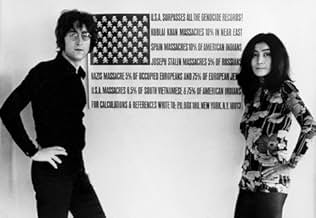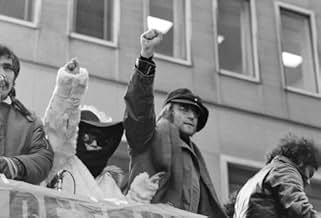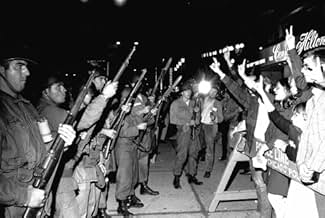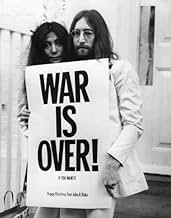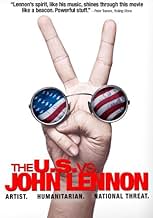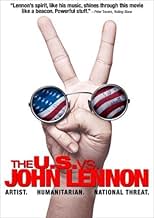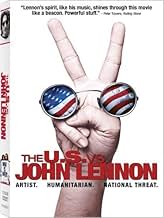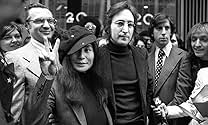IMDb RATING
7.3/10
5.7K
YOUR RATING
A documentary on the life of John Lennon, with a focus on the time in his life when he transformed from a musician into an antiwar activist.A documentary on the life of John Lennon, with a focus on the time in his life when he transformed from a musician into an antiwar activist.A documentary on the life of John Lennon, with a focus on the time in his life when he transformed from a musician into an antiwar activist.
- Directors
- Writers
- Stars
- Awards
- 2 nominations total
John Lennon
- Self
- (archive footage)
- Directors
- Writers
- All cast & crew
- Production, box office & more at IMDbPro
Featured reviews
I hope everyone sees this film, as it is a window into the life of an extraordinary person, who really did influence a generation with his music and his courage. But, I especially hope that the generations that came after John Lennon left us, so unexpectedly, have a chance to see this thoughtful and fitting tribute to the gentle artist who turned the hurt he experienced as a child into an international revolution with a spirit so open and willing to risk everything he had to teach the world that all we really need is love. This film explains to all of us, who were too young to understand what was going on, at the time, how John Lennon was persecuted by the U.S. government for simply expressing his opinion about the war in Viet Nam. How he was investigated, tapped, and followed, then threatened with deportation, in an effort to derail a tour that might have had a significant influence on the outcome of the 1972 presidential election, in which Richard Nixon was re-elected. The scenes of teenagers burning their Beatles records in protest of his quip that the Beatles had become more popular than Jesus, are eerily parallel with the Dixie Chicks fans who did the same thing. Excerpts from Nixon's speeches about the war are almost word-for-word the same rhetoric we get from Bush. This film is important, and moving, and includes some of the best music I know I'll ever hear in this lifetime. Go see it and get inspired.
Imagine, for a moment, you could do anything. What would you do? Already at the height of his career, the sheer scale of possibilities before John Lennon amazed even this high-aspiring rebel. Triggered in no small part by his meeting with Yoko Ono, a conceptual artist obsessed with breaking down barriers, Lennon had to decide if there was a greater purpose to which he could devote his musical talent, fame and fortune. Mass protests against the Vietnam War were sweeping America. Lennon's aspiration became quite simple (some would say simplistic): let's give peace a chance. The U.S. vs. John Lennon uses previously unreleased archive footage, plus documentation obtained under the Freedom of Information Act, to chart this ex-Beatle's political activism and his struggle with the U.S. authorities in the late 60's and early 1970's.
It's a remarkable tour de force. Many people know Lennon as an ex-Beatle, for his song Imagine and the fact that he got shot. The extent of his political activism, the method in his apparent madness, would seem more like another conspiracy theory in less capable hands. Lennon's efforts seem directly linked (initially) to getting another activist out of jail and then making sure the war-bent presidency, White House and FBI lose lots of sleep over the war.
Directors Leaf and Scheinfeld are past masters at making serious pop culture retrospectives. In an age of technology and spin, how do we know 'documentary' filmmakers are telling us facts? Firstly, what's on the film. There are interviews with high-ranking former government and FBI agents. Then there are declassified documents, not just quoted but shown on the screen. Finally there is the official website which provides an external way of checking transparency and sources once you get home. If you thought Lennon was a cool guy - or maybe even your childhood hero - this film shows how incredibly cool - and courageous - he actually was.
Says director Scheinfeld: "We live in a time where everything's a reality show. John and Yoko were essentially pioneers in that, but they weren't using it to promote an album. They weren't using it to promote a movie. They weren't doing it to promote anything except peace and that's what makes them heroic artists here. And then to have the courage to stand up to the power of the United States - the presidency, the White House, the FBI and the INS . . ." Lennon's song 'Give Peace a Chance' became the national anthem of the anti-war movement. He linked up with other activists (including the Black Panther movement) using his public persona - and often his own money - to synchronise the peaceful protests and give them such force that, at the point where Nixon was campaigning for re-election, Lennon had been singled out for deportation. He backed down over personal appearances at an anti-Nixon concert tour (which would follow the latter's campaign trail) as government officials stepped up the campaign of harassment against him with wiretapping and surveillance. Rightly or wrongly, Lennon feared for his life. This was a time when the Secret Services had the authority to take people out if deemed in the national interest.
The website documentation shows how the Reagan administration continued to obstruct release of information on Lennon even in April 1981. The FBI cited its authority under the Freedom of Information Act to withhold "information which is currently and properly classified . . . in the interest of the national defense or foreign policy." The downside of the film is that many people simply won't care. Gore Vidal takes a modern sideswipe at Bush and Iraq, but the comparison is weak. Vietnam was not preceded by a 9/11 or a Pearl Harbour and the united opposition to the Vietnam War was on an unprecedented level: protests turned into riots, several civilians were shot, and the powers of the government were far reaching even by today's standards. Although the film sometimes plays like a top-notch TV documentary, the levels of professionalism shown by the filmmakers set it apart. It's also an unsung paean to the most important part of Lennon's life and what he would no doubt like to be remembered for. He might not have been Gandhi, but there was more to him than the wacky, druggy rockstar most of us remember.
"You may say that I'm a dreamer, But I'm not the only one," wrote Lennon.
It reminded me of another famous saying: "All men dream: but not equally . . . the dreamers of the day are dangerous men, for they may act their dream with open eyes to make it possible." The U.S. vs. John Lennon is more than a testament to John Lennon. It is the story of how one man tried to make his dreams reality.
It's a remarkable tour de force. Many people know Lennon as an ex-Beatle, for his song Imagine and the fact that he got shot. The extent of his political activism, the method in his apparent madness, would seem more like another conspiracy theory in less capable hands. Lennon's efforts seem directly linked (initially) to getting another activist out of jail and then making sure the war-bent presidency, White House and FBI lose lots of sleep over the war.
Directors Leaf and Scheinfeld are past masters at making serious pop culture retrospectives. In an age of technology and spin, how do we know 'documentary' filmmakers are telling us facts? Firstly, what's on the film. There are interviews with high-ranking former government and FBI agents. Then there are declassified documents, not just quoted but shown on the screen. Finally there is the official website which provides an external way of checking transparency and sources once you get home. If you thought Lennon was a cool guy - or maybe even your childhood hero - this film shows how incredibly cool - and courageous - he actually was.
Says director Scheinfeld: "We live in a time where everything's a reality show. John and Yoko were essentially pioneers in that, but they weren't using it to promote an album. They weren't using it to promote a movie. They weren't doing it to promote anything except peace and that's what makes them heroic artists here. And then to have the courage to stand up to the power of the United States - the presidency, the White House, the FBI and the INS . . ." Lennon's song 'Give Peace a Chance' became the national anthem of the anti-war movement. He linked up with other activists (including the Black Panther movement) using his public persona - and often his own money - to synchronise the peaceful protests and give them such force that, at the point where Nixon was campaigning for re-election, Lennon had been singled out for deportation. He backed down over personal appearances at an anti-Nixon concert tour (which would follow the latter's campaign trail) as government officials stepped up the campaign of harassment against him with wiretapping and surveillance. Rightly or wrongly, Lennon feared for his life. This was a time when the Secret Services had the authority to take people out if deemed in the national interest.
The website documentation shows how the Reagan administration continued to obstruct release of information on Lennon even in April 1981. The FBI cited its authority under the Freedom of Information Act to withhold "information which is currently and properly classified . . . in the interest of the national defense or foreign policy." The downside of the film is that many people simply won't care. Gore Vidal takes a modern sideswipe at Bush and Iraq, but the comparison is weak. Vietnam was not preceded by a 9/11 or a Pearl Harbour and the united opposition to the Vietnam War was on an unprecedented level: protests turned into riots, several civilians were shot, and the powers of the government were far reaching even by today's standards. Although the film sometimes plays like a top-notch TV documentary, the levels of professionalism shown by the filmmakers set it apart. It's also an unsung paean to the most important part of Lennon's life and what he would no doubt like to be remembered for. He might not have been Gandhi, but there was more to him than the wacky, druggy rockstar most of us remember.
"You may say that I'm a dreamer, But I'm not the only one," wrote Lennon.
It reminded me of another famous saying: "All men dream: but not equally . . . the dreamers of the day are dangerous men, for they may act their dream with open eyes to make it possible." The U.S. vs. John Lennon is more than a testament to John Lennon. It is the story of how one man tried to make his dreams reality.
For those who are too young to remember the real John Winston Ono Lennon -- this film is a good introduction to why he mattered so, why so many people were (and are) devoted to him as an artist and a man, why he was truly the most original voice of his generation.
The film is not perfect -- but in its defense, it covers an extraordinary amount of material and does it well.
Lennon lived 100 lifetimes between 1969 and 1975.
This film concentrates on the biggest conflict he faced at that time: his struggles to remain in the US, and the right-wing paranoia (exemplified by FBI director J Edgar Hoover and Nixon's hatchet man, John Ehrlichman.)
Lennon's sincerity, his naiveté, his charisma shine throughout.
Yoko has been attacked (so what else is new) for being such a strong presence in the film but she was right there beside him. They lived it all together. And she does not use her camera time to diminish him in any way.
Strong recommendation -- primarily because we have to remind ourselves that there are times to speak up and times to act.
John Lennon: we miss you so.
The film is not perfect -- but in its defense, it covers an extraordinary amount of material and does it well.
Lennon lived 100 lifetimes between 1969 and 1975.
This film concentrates on the biggest conflict he faced at that time: his struggles to remain in the US, and the right-wing paranoia (exemplified by FBI director J Edgar Hoover and Nixon's hatchet man, John Ehrlichman.)
Lennon's sincerity, his naiveté, his charisma shine throughout.
Yoko has been attacked (so what else is new) for being such a strong presence in the film but she was right there beside him. They lived it all together. And she does not use her camera time to diminish him in any way.
Strong recommendation -- primarily because we have to remind ourselves that there are times to speak up and times to act.
John Lennon: we miss you so.
Those who do not learn from history are doomed to repeat it. If "The U.S. vs. John Lennon" is anything, it's an examination of the similarities between the Nixon Administration and the national debacle that was the Vietnam War, compared to the current Bush Administration and the national debacle that is the Iraq War. The difference, of course, is that Nixon had John and Yoko Lennon to contend with. Who do we have to lead our protests and write our anthems? Michael Moore? Not good enough.
When Lennon moved to New York City in 1970, the Nixon Administration was terrified that he had the power to organize the anti-war protesters and affect the outcome of elections (particularly Nixon's 1972 run for re-election). Lennon was wiretapped and followed by the FBI (which was being used at that time to "quell decent"). The Immigration and Naturalization Service tried for five years to deport him, but he got a lawyer and fought back, and in 1976, on his birthday, on his son Sean's birthday, he learned that he and Yoko had won their case, and they could stay.
"The U.S. vs. John Lennon" makes you want to take a stand, organize a protest, demand peace, and stick it to the man!
When Lennon moved to New York City in 1970, the Nixon Administration was terrified that he had the power to organize the anti-war protesters and affect the outcome of elections (particularly Nixon's 1972 run for re-election). Lennon was wiretapped and followed by the FBI (which was being used at that time to "quell decent"). The Immigration and Naturalization Service tried for five years to deport him, but he got a lawyer and fought back, and in 1976, on his birthday, on his son Sean's birthday, he learned that he and Yoko had won their case, and they could stay.
"The U.S. vs. John Lennon" makes you want to take a stand, organize a protest, demand peace, and stick it to the man!
One of the younger reviewers commented:
"I couldn't help but compare the era and social climate around this movie to what we are experiencing today. I am disturbed and disappointed. Why is it that it seemed as if there were loads more people being active in what they believed back in those days. I understand that it was a different time, and many in the world were just learning to use their voices... Perhaps we feel that we just don't know enough about a subject to get behind it and speak out? ... Perhaps large protests are just being overlooked because we as viewers or the media is over it... I am just wondering why I haven't done more. Why does it seem as if people today (not just my "generation" or my "community") are fearful or apathetic towards fighting for what they think is right? I don't want to preach or be dramatic here - I'm not telling you to view things my/their/our/its/his/her way. I'm just saying, I can't imagine that we've gone through life without seeing some sort of injustice - there has to be something you've seen that you think is wrong... why not say something about it? Is being charitable enough anymore? Awareness is key. Why is there this silence amongst us?"
Perhaps I'm being too simplistic, but I've often thought as a survivor of the Viet-Nam era, that the main reason we haven't seen protests of the magnitude depicted in The US vs John Lennon in recent times is simply the absence of the draft. Plenty of people again object to the war situation, but without the threat of involuntary servitude there simply is no critical mass. The fear of self, friends, and family being rounded up and shot proved great motivation to get people out in the streets back then. The censorship of the media imposed since Viet-Nam (embedded journalists, qv) has also helped still the voices.
So at the very least, this film has helped present an historical perspective all but absent in the present day. Viet-Nam so divided the country that the divisions remain today. Yet that war is curiously neglected in our educational curricula.
Beyond that is revealed a portrait of John Lennon, artist and young man. Lennon, the single one of the Four who strove at great personal cost to better the world with far more than silly love songs is revealed here in a montage of film and stills that conveys far more than the press of the time was able or wiling to.
The film opens with footage from his 1971 appearance at the John Sinclair Freedom Rally at Crisler Area in Ann Arbor, Michigan. As a former UM Ann Arbor Student I particularly appreciate how the producers of the film illustrate the pivotal nature of that event. At the time the event seemed like a big deal locally, but one that was lost amongst the din of social commotion. As close as I was geographically, I didn't realize then just how influential Lennon's (or Sinclair's) involvement was in the successful movement to end the war.
I suggest that any student (young or older) of how that peace movement progressed back then should see this film. Serious students should see it more than once. In addition to the collection of seldom seen film footage, there is a very fine sound track. See the film on the big screen if you can. I'll put my order in for the DVD as soon as it can be had, but the big screen, hi-fi version rocks.
"I couldn't help but compare the era and social climate around this movie to what we are experiencing today. I am disturbed and disappointed. Why is it that it seemed as if there were loads more people being active in what they believed back in those days. I understand that it was a different time, and many in the world were just learning to use their voices... Perhaps we feel that we just don't know enough about a subject to get behind it and speak out? ... Perhaps large protests are just being overlooked because we as viewers or the media is over it... I am just wondering why I haven't done more. Why does it seem as if people today (not just my "generation" or my "community") are fearful or apathetic towards fighting for what they think is right? I don't want to preach or be dramatic here - I'm not telling you to view things my/their/our/its/his/her way. I'm just saying, I can't imagine that we've gone through life without seeing some sort of injustice - there has to be something you've seen that you think is wrong... why not say something about it? Is being charitable enough anymore? Awareness is key. Why is there this silence amongst us?"
Perhaps I'm being too simplistic, but I've often thought as a survivor of the Viet-Nam era, that the main reason we haven't seen protests of the magnitude depicted in The US vs John Lennon in recent times is simply the absence of the draft. Plenty of people again object to the war situation, but without the threat of involuntary servitude there simply is no critical mass. The fear of self, friends, and family being rounded up and shot proved great motivation to get people out in the streets back then. The censorship of the media imposed since Viet-Nam (embedded journalists, qv) has also helped still the voices.
So at the very least, this film has helped present an historical perspective all but absent in the present day. Viet-Nam so divided the country that the divisions remain today. Yet that war is curiously neglected in our educational curricula.
Beyond that is revealed a portrait of John Lennon, artist and young man. Lennon, the single one of the Four who strove at great personal cost to better the world with far more than silly love songs is revealed here in a montage of film and stills that conveys far more than the press of the time was able or wiling to.
The film opens with footage from his 1971 appearance at the John Sinclair Freedom Rally at Crisler Area in Ann Arbor, Michigan. As a former UM Ann Arbor Student I particularly appreciate how the producers of the film illustrate the pivotal nature of that event. At the time the event seemed like a big deal locally, but one that was lost amongst the din of social commotion. As close as I was geographically, I didn't realize then just how influential Lennon's (or Sinclair's) involvement was in the successful movement to end the war.
I suggest that any student (young or older) of how that peace movement progressed back then should see this film. Serious students should see it more than once. In addition to the collection of seldom seen film footage, there is a very fine sound track. See the film on the big screen if you can. I'll put my order in for the DVD as soon as it can be had, but the big screen, hi-fi version rocks.
Did you know
- Quotes
Gore Vidal: Patriotism is the last refuge of the scoundrel.
- SoundtracksJohn Sinclair
Written by John Lennon
Performed by John Lennon
Courtesy of Capitol Records
Under license from EMI Film & Television Music
- How long is The U.S. vs. John Lennon?Powered by Alexa
Details
- Release date
- Country of origin
- Language
- Also known as
- The U.S. vs. John Lennon
- Production companies
- See more company credits at IMDbPro
Box office
- Gross US & Canada
- $1,109,146
- Opening weekend US & Canada
- $69,143
- Sep 17, 2006
- Gross worldwide
- $1,408,065
- Runtime
- 1h 39m(99 min)
- Color
- Aspect ratio
- 1.78 : 1
Contribute to this page
Suggest an edit or add missing content


